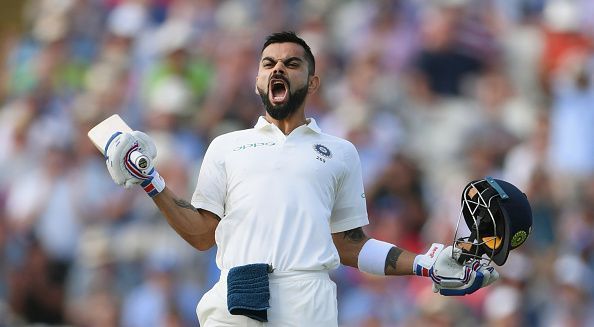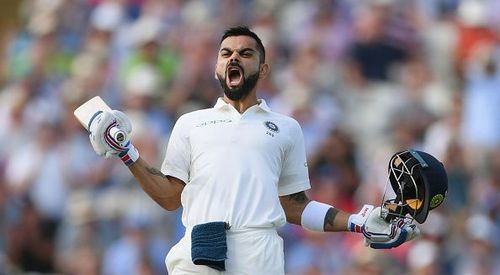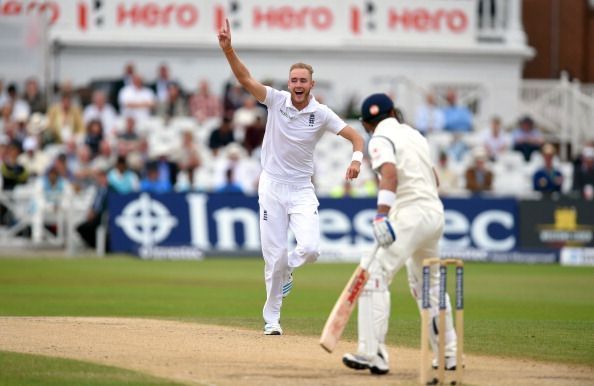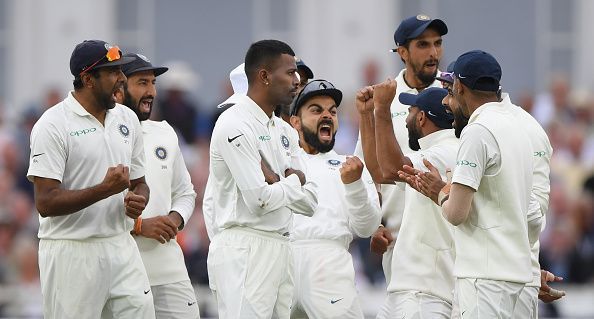
Virat Kohli: The Myth of Sisyphus

James Anderson took flight, one arm raised in ecstasy at the event of a likely victory; Mohammed Shami looked behind him in disarmed hope, his stumps castled from the sheer pace and willful swing; the crowd erupted and Alastair cook smiled. Most cricketers wane from the public eye, and men of Cook's stature are more likely to fizzle out than go out in one final flurry of magnificence. However, Cook had scored 147. Cook would be declared the man of the match, in his final Test ever. Cook, the poster boy of English cricket for so long, their long-reigning opener and captain of several memorable triumphs had had the last laugh, one he had very much deserved.
A 1-4 scoreline is at once debilitating and heartbreaking - heartbreaking because India did not deserve such a harsh result, and debilitating because in some way they did.
Losses, no matter how fought they are, are still losses. These are the only losses that matter even. But for the submission at Lord's, India had given it their best, faltering only during the final sprint. Perhaps it was only fitting that their captain shared the same fate through the progress of the series.
An unlikely first ball duck in the second innings at the Oval, falling to Stuart Broad at the close of the fourth day, meant that Virat Kohli had to watch from the stands on the final day as his team battled to save their blushes. Virat Kohli, like India, had stumbled on the very last hurdle. Virat Kohli, like India, would lose, having stood tall for the entire way.

The ghosts of previous failures were there to haunt Kohli before the series began. His batting against the swinging ball - both in and out, but most particularly the one swinging out - was susceptible, and England had in its ranks one of the finest swingers of the red ball - Jimmy Anderson.
But Kohli held on. Kohli almost always holds on.
A scintillating 149 and 51 in the first Test at Edgbaston was more than enough to calm the nerves of the nay-sayers. India might have lost - a Test they should have won - but Virat Kohli was back where he was used to, leading the charge from the front.
The second Test ended up in misery, and naturally, India faltered. A combined 40 runs in the Test was not enough, but that 40 made up close to 17% of the runs the team scored - a paltry 107 in the first innings and an embarrassing 130 in the second.

The third Test brought with it a change in fortunes - another combined 200 runs for the captain, and a win by almost exactly that figure for the team - only 3 runs more. Adjudged man of the match for his match-winning performance, the Delhi-ite had delivered on his high expectations, and India seemed to be on the right track.
Another century in the fourth Test, but a collective batting failure in the second innings (but for Kohli and Ajinkya Rahane) sealed the series in the favor of the host, handing India another overseas series loss in Tests.
Voices were raised questioning the commitment of certain players. Fingers were pointed. Stats overanalyzed. Doom-day prophecies cried out. But none of them questioned Virat Kohli. None of them could. None of them would.
For people born who grew up watching Indian cricket for long, this isn't anything new. First, it was Sunil Gavaskar and his stubbornness to let the ball go behind. Then came Sachin Tendulkar and everything genius that came with him. Now, it is Virat Kohli and his mutterings under his breath.
But neither Gavaskar nor Tendulkar made enterprising captains. Some of it was just down to misfortune. Some of it came due to the added pressure on their part to perform. Both Gavaskar and Tendulkar had to fight on two fronts alone, and it is no easy job.
So far into his stint as captain, Kohli has stuck to his batting. But as a captain, he seems to be destined almost for the same track, but for his exploits in home conditions. Overseas, India still suffers, still lose from winning positions, still throw away their wickets - leaving their captain stranded for reasons.
In Greek mythology, King Sisyphus was destined to roll a large boulder all the way to the top of a mountain, at the end of which the boulder would roll back to the start and Sisyphus would start once more - leaving him stuck for eternity doing the same task all over, futile and exasperated.

At this point, that is what Kohli has been reduced to. His runs, beautiful as they are, are failing to contribute to the result because of those around him. Very soon, Sisyphus will know fatigue. Very soon, Sisyphus will soon have to sit down.
Sisyphus teaches the higher fidelity that negates the gods and raises rocks. He too concludes that all is well... The struggle itself toward the heights is enough to fill a man’s heart. One must imagine Sisyphus happy.
"One must imagine Sisyphus happy," wrote Albert Camus.
We can only hope that our Sisyphus is because he has given us his all.